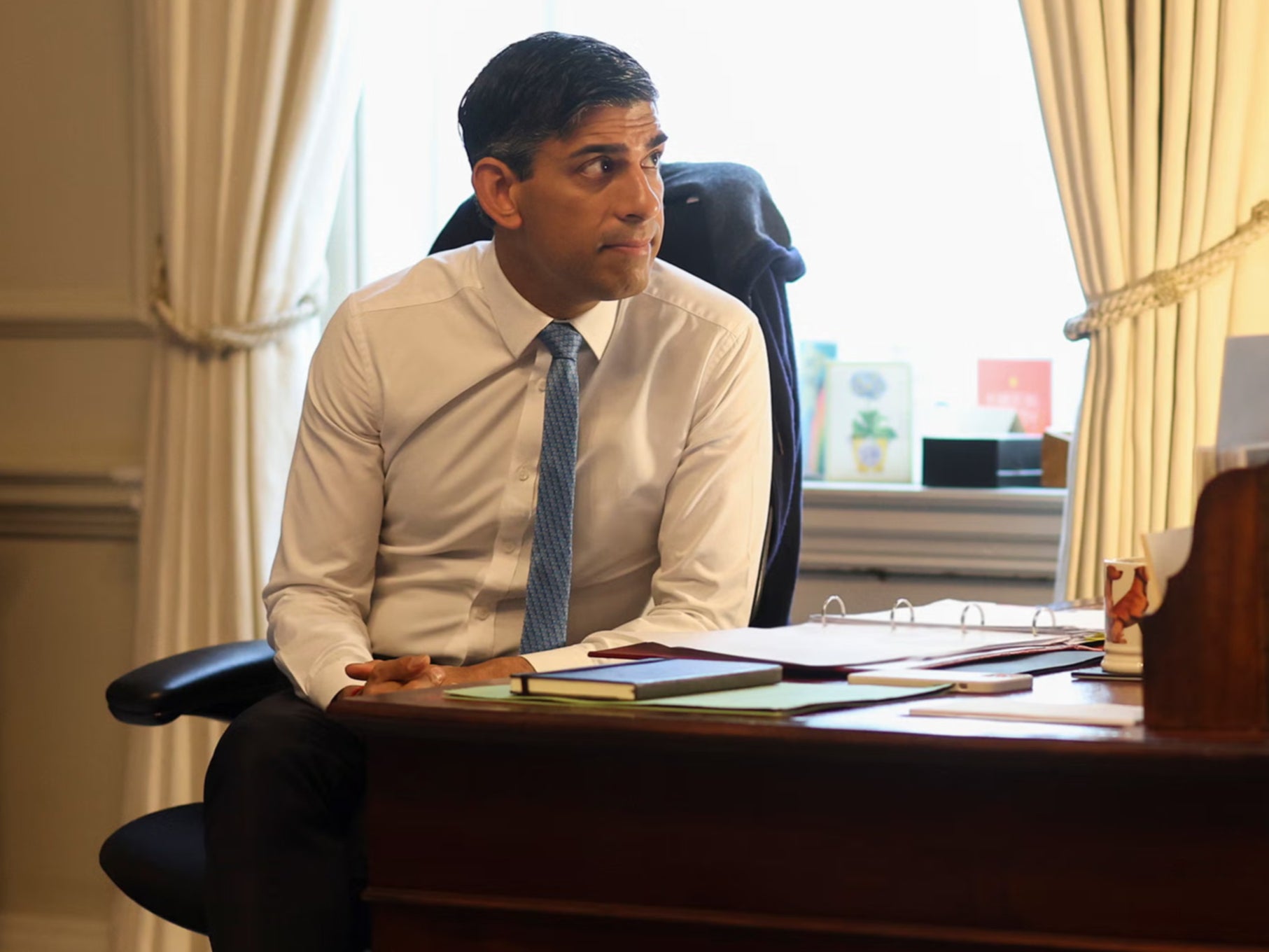How Sunak’s early starts could lead to governing with eyes shut
In a very different war on ‘woke’, the prime minister is determined not to sleep in, says Sean O’Grady


A brisk, post-breakfast start to the latest cabinet reshuffle appears to confirm reports that Rishi Sunak is a bit of an early bird – so much so that he is driving his civil servants towards daybreak deadlines. Apparently, the prime minister has such an appetite for hard work, served up with a hefty side order of stats and spreadsheets, that he is up by 6am and his staff must be well prepared for interrogation at nine. In extreme cases, they have to rise at the same ungodly hour as Mr Sunak in order to ready themselves. “Weekends aren’t safe,” says one.
Mr Sunak is no party animal, and is said to rarely go out for dinner. His regime is notably more vigorous than that of Liz Truss (a late night karaoke fan), Boris Johnson (convivial, lazy), or David Cameron (of ‘‘chillaxing’’ fame) – though Theresa May did put the effort in. But austere habits have not always translated to success in 10 Downing Street. History suggests that you can be a competent premier without working yourself into the ground.
Is it true that Margaret Thatcher made do with four hours’ sleep?
This legend is somewhat exaggerated, but she did long hours and disliked holidays; here was someone who really enjoyed the job and became defined, even captured by it. Her official biographer, Charles Moore, describes her day as starting at around six with the BBC World Service news, the Radio 4 Today programme, and a light breakfast. She’d be down in the office by 8.30am to get on with the usual busy schedule. Aside from a brief catnap at 11pm, her day would stretch until about 1 or 2am as she ploughed through briefings, worked, or talked about work. However, some attribute her later dementia to this long-term lack of sleep and, Moore notes judiciously, “although she did have immense stamina and a huge appetite for work, she was not as invincible as she believed. She got very tired, and when this happened, she talked more and achieved less.” Mr Sunak, take note.
Others were more careful about their work-life balance weren’t they?
Among the many more normal personalities who occupied No 10 was John Major, whose premiership was eventful, highly pressured and often close to collapse yet he got things done and made sure he had eight hours of slumber. Harold Wilson was fond of pointing out that he always got to sleep as soon as his head hit the pillow, yet he, too, probably worked too hard and may also have paid the price in cognitive decline late in life. When he resigned in 1976, Wilson told his cabinet that, apart from “quite generous holidays,” he was occupied with official duties “seven days a week, at least 12 to 14 hours a day”. But he didn’t regard it all as toil. Who wouldn’t enjoy a private gossip with the queen every week? Wilson said the “variety and interest” of the job, “with usually, at least 500 different documents or submissions to read on an average weekend after a busy week, means that you do not get bored; consequently you do not get tired.” Or maybe a glass of brandy convinces you otherwise.
What if you get it wrong?
Then you make poor decisions, as the sick and insomniac Anthony Eden did over the Suez Crisis in the 1950s. One observer was shocked by the “drained, red-eyed” appearance of Tony Blair, midway through his time in office, dealing with simultaneous crises in Iraq and Ireland. “One visitor to the prime minister’s office reports seeing bottles of pills and an inhaler on the desk, medical crutches to keep the man on his feet. It’s said that Tony Blair has been looking so strung out because he has got a nasty dose of the flu. I suspect that the reverse is the case. He can’t shake off the flu because he is so utterly exhausted.” Later, Blair confessed he occasionally resorted to a little too much red wine as he coped with the stress. Aside from the teetotal Jim Callaghan, and fizzy Coke addict Rishi Sunak, a snifter or two seems to be an informal prime ministerial sleeping aid.
And the greatest of the late risers?
Winston Churchill won the war on late nights and “working from bed” of a morning. By his second premiership in 1951, Churchill often entertained cabinet colleagues in the bedroom of No 10, cigar ash all over the counterpane and his poodle, Rufus, and budgerigar, Toby, in attendance. Toby was said to especially enjoy perching on the bald pate of chancellor Rab Butler, with the inevitable avian consequences, as the men discoursed on the latest sterling crisis. The business of government can be messy at times.
Subscribe to Independent Premium to bookmark this article
Want to bookmark your favourite articles and stories to read or reference later? Start your Independent Premium subscription today.



Join our commenting forum
Join thought-provoking conversations, follow other Independent readers and see their replies
Comments